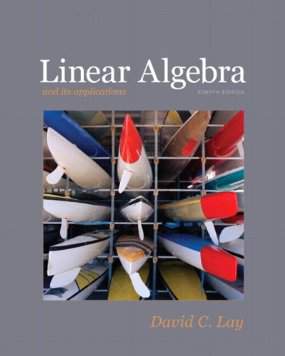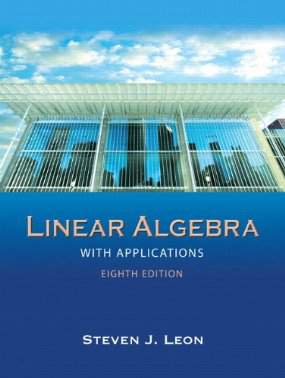Connecting...

This is a quick preview of the lesson. For full access, please Log In or Sign up.
For more information, please see full course syllabus of Linear Algebra
For more information, please see full course syllabus of Linear Algebra
Linear Algebra Linear Systems
Lecture Description
In this introduction to linear algebra we want to start you off with some basics of the course. You should have already been introduced to equations with one variable; what linear algebra utilizes greatly are multiple equations with multiple variables. However, there are not always specific answers for each of the variables, and so we’ll also discussion the types of solutions you’ll encounter when doing some problems. We’ll also equip you with a solving method to be used should there be exactly one solution for each variable. Next video we’ll get into a new way to think of data rather than a bunch of variables.
Bookmark & Share
Embed
Share this knowledge with your friends!
Copy & Paste this embed code into your website’s HTML
Please ensure that your website editor is in text mode when you paste the code.(In Wordpress, the mode button is on the top right corner.)
×
- - Allow users to view the embedded video in full-size.
Next Lecture
Previous Lecture










































 Answer Engine
Answer Engine




0 answers
Post by John Lins on January 30, 2017
Could you please explain what would be the solution to this question below?
Show that this pair of augmented matrices are row equivalent, assuming ad-be# 0:
(a b |e) ~ (1 0 |(de-bf) / (ad-bc))
c d |f (0 1 |(af-ce) / (ad-bc)
1 answer
Wed Jan 18, 2017 8:13 PM
Post by Mohsin Alibrahim on January 10, 2017
Hi Professor H
In ex 5, why didn't you multiply the first equation by (-5) and eliminate the x variables the x immediately instead of what you did when worked on 1,2 and 1,4 separately.
1 answer
Tue Nov 29, 2016 2:40 AM
Post by manu vats on November 25, 2016
which textbook should i use for this course
1 answer
Sun Nov 6, 2016 4:37 PM
Post by El Einstein on November 5, 2016
Would you classify "infinite # of solutions" as Consistent or Inconsistent? Im slightly confused.
I'm assuming that as long as the system of linear equations has at least one solution, it will be considered as Consistent. Is this a correct assumption?
3 answers
Last reply by: cary pope
Fri Nov 18, 2016 9:27 PM
Post by cary pope on October 15, 2016
Professor Hovasapian, You are so good at explaining science and mathematical concepts. Your videos are well formed and extremely useful. The first lessons of yours I watched was on multivariable calculus. I was way ahead of my class and fell in love with vector calculus, with your videos and explanations being a major factor. I feel lucky, I'm taking linear algebra and chemistry at the moment and was pleasantly surprised to find out that you have courses for each on educator.com. I just wanted to mention how much you're helping me and how good you are. I love how you simplify things and include tricks to visualize the process of what you are actually doing with the mathematics, your multivariable calculus course was brilliant. I'm enjoying your chemistry and linear algebra coases as well. Any chances of you making a course on complex analysis? I'm taking that next semester!
Thank you for making these effective videos that are on target and to the purpose!
Cary
1 answer
Sat Sep 10, 2016 2:17 AM
Post by Kaye Lim on September 9, 2016
For a case of 2 unknowns with 3 equation, after solving this, let's say we get 1 solution (x,y). How would the graph look like? Does it mean 3 lines meet at a point (x,y) in the solution?
-Is it possible for these 3 lines to meet at 2 points?
1 answer
Fri Jun 17, 2016 6:24 PM
Post by Emily Lewis on June 16, 2016
Why did you decide to use elimination for all of these examples when substitution would have been much easier for some of them?
1 answer
Tue Apr 7, 2015 10:50 PM
Post by Micheal Bingham on March 31, 2015
You have an absolutely beautiful verbiage, I know that this does not pertain to the lecture but do you have any advice how one could become as articulate as you?
1 answer
Mon Mar 2, 2015 6:37 PM
Post by julius mogyorossy on March 1, 2015
Dr. do I need your course to take the college Algebra CLEP test?
1 answer
Mon Feb 2, 2015 4:02 PM
Post by Danial Shadmany on February 1, 2015
Hi Professor,
I was just wondering if you will cover singular value decomposition in this course. I didn't see it in the syllabus and wondered if you'd still cover it in this course.
Thanks!
1 answer
Fri Nov 21, 2014 9:29 PM
Post by Eric Liu on November 21, 2014
Hi Professor Hovasapian,
I know your Calculus AB course is going to be released sometime in the coming months, but I was wondering if you will be doing a Calculus BC course for educator.com as well?
Thanks!
2 answers
Last reply by: Miguel Villarreal
Mon Jun 2, 2014 9:44 AM
Post by Miguel Villarreal on June 2, 2014
@31:32 Example VI 3 equations and 2 unknowns because y=4 if the other y=x another variable would we solve for both or does become an inconsistent system because they are different?
Thank you
0 answers
Post by MOHAMMED ALHUMAIDI on December 7, 2013
Hello
When i try to download lecture slides it is show without any answer on it??
1 answer
Mon Sep 23, 2013 4:17 PM
Post by Jawad Mustafa on September 22, 2013
Thank you very much for offering this course
Jawad Mustafa
Amman - Jordan
3 answers
Wed Dec 30, 2015 12:03 AM
Post by Manfred Berger on May 29, 2013
I've been thinking about example 4 for a bit, and it seems to me that the reason you're not getting a single point as your solution there is you're intersecting 2 planes, which in turn leads to a line as your result.
1 answer
Fri Apr 12, 2013 4:33 PM
Post by Rishabh Jain on April 12, 2013
I love your lecture SIR !!! AMAZINGGGGGGGGG !!!!!!!!!!
1 answer
Thu Oct 11, 2012 3:29 PM
Post by Aniket Dhawan on October 11, 2012
You are a great teacher. I really liked your explanations,they helped me a lot.
Thankyou professor
3 answers
Last reply by: Aniket Dhawan
Thu Oct 11, 2012 5:09 AM
Post by Suhaib Hasan on October 4, 2012
Your comment about induction and math was great.
2 answers
Last reply by: Rob Lee
Thu Sep 27, 2012 6:18 PM
Post by robert lee on September 26, 2012
Question: at 36:02. I am slightly confused with your graph, I understand the no solution case, where the lines are parallel and never meet.
The one solution case meets at one point (in other words if it was three or more lines, they should all intersect at the same point then?)
Now the infinite case, I do not understand at all, what does it mean when the line is on top of another line? Doesn't this just mean that they meet at one point? So it would be just like the one solution case then... How is this possible?
In my imagination, an infinite solution would be more like a graph of a sin and cos equation, cause then they would intersect at multiple points, but then this would not be linear??
Can you please clarify?
Thank you.
1 answer
Fri Sep 21, 2012 2:34 PM
Post by Erdem Balikci on September 20, 2012
Very well done! Clear and smooth!!
0 answers
Post by Maimouna Louche on June 17, 2012
Thanks I get it now, it looked scary for nothing.
0 answers
Post by Maimouna Louche on June 15, 2012
I will be taking this class soon. Man it look hard :( I will be fine, I have Educator now! ^^
0 answers
Post by Real Schiran on February 29, 2012
All understood. This lecture is very clear. Thanks
1 answer
Last reply by: Constantin Ficiu
Thu Oct 24, 2013 2:34 PM
Post by amir szeinberg on February 18, 2012
I have a problem re-entering the lecture in the middle, say in the 20th minute, and I have to strart from the begining. Is there any thing I could do about it?
Thanks in advance,
Amir
0 answers
Post by thomas kotch on December 18, 2011
He is great!
0 answers
Post by Senghuot Lim on December 18, 2011
Einstein?
0 answers
Post by Arthur Bookstein on October 12, 2011
Very well explained.
1 answer
Last reply by: Constantin Ficiu
Thu Oct 24, 2013 2:30 PM
Post by Jason Mannion on October 4, 2011
I subscribed to this site because I was having great difficulties in my university Linear Algebra class. So I have only watched the "Linear Systems" lecture, and from that I can conclude a few things: 1)Dr. Hovasapian actually has the ability to organize a course, 2) He knows how to present material in a educational manner, and 3) in the one video I learned more than I did in several weeks of my university lectures.
(the problem is simply that my professor lacks any teaching abilities, and cannot organize the material. We started our course with complex numbers, and then went straight into vectors and subspaces, without any explanation as to what a linear system was, how to solve one, or even how to do basic matrix arithmetic! In fact, we never see any matrices in class!)
0 answers
Post by Travis Torres on October 1, 2011
Very well done. I'll admit I was a little confused by the initial lecture on Linear Systems, but the examples themselves were very informative and helpful.